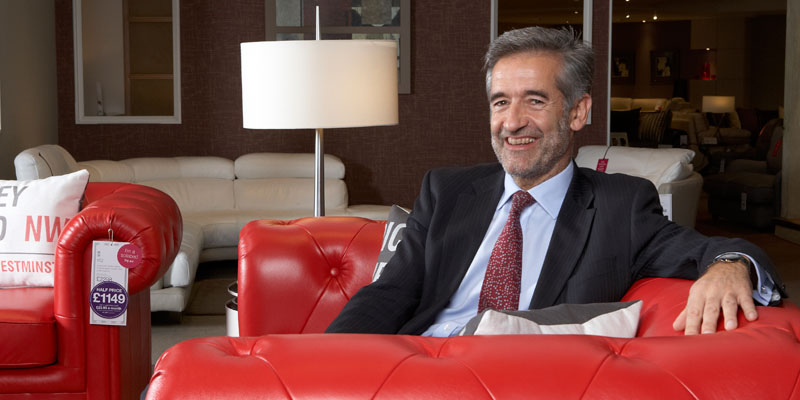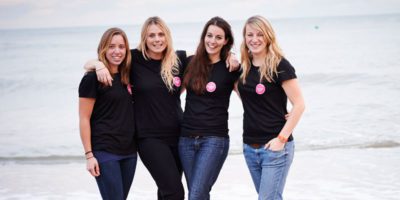Ian Filby is Chief Executive of furniture retailer, DFS. He joined three and a half years ago, following a long and successful tenure at Boots. In 2007 he oversaw the launch of No 7 ‘Protect and Perfect’ anti-wrinkle serum that saw a frenzied rush of shoppers queuing at 5am on launch day after a BBC programme backed the lotion’s age defying claims. He has repositioned the DFS brand to become more female friendly and has a track record of creating gender balanced teams. He tells us how women are an integral part of his strategy to drive forward progress in the company.

…my observation is that when you have mixed teams, it takes the rough edges out of any of the behaviours you get when you have all female or all male groups. I’ve always tended to find it calms some of the extreme male or female behaviours…
Please tell us about your career history to date
When I left university I went into retail as a marketing trainee for Boots, back in 1981. It was a great grounding because you ended up being somewhere between a marketer and a buyer. One of the beauties of Boots as an outfit is that 50% of its product is its own brand. We were vertically integrated, had our own factories, which was unusual for retailing. We had our own labs, our own product development.
I got the full gamut of expertise in marketing as well as learning the essentials of how to source product, buy it cheaply, negotiate with suppliers and develop promotional programmes.
Like a lot of people, when I reached 50 and reached the end of my career as a trading director at Boots, I set up my own little retail brand consultancy. I went on to be Interim CEO at Nectar for a while and then the opportunity came suddenly do something a little bit leftfield and run DFS as CEO, which I started just under four years ago now.
What did your time at Boots teach you about marketing to female customers?
It was fascinating. It influences my current outlook at DFS because in my early days at Boots, the whole organisation was very senior, very male. It was completely male biased and yet you won’t be surprised to know the customer base at Boots is 86% female and 14% male. So you suddenly think, well isn’t it interesting; you’ve got an organisation being run by men, when virtually every woman in the UK shops at Boots. Boots have something like eight million transactions a week, of which 86% will be female.
When you were trading director, you created a 50/50 team of women and men. Please can you tell us about this?
I witnessed the logical increase in the number of women going up in seniority at Boots over time, but then when I became trading director I appointed the first female senior commercial directors. I appointed three very capable women, who have subsequently done very well, including the lady with whom I worked on the famous No 7 ‘Protect and Perfect’ initiative.
If I reflect back, I suspect that if she hadn’t been commercial director of No 7 at the time, that maybe ‘Protect and Perfect’ wouldn’t have happened. It really was a massive success story for the brand.
When I created that team at Boots it was pretty much a 50/50 team. I think that was a very healthy state of affairs.
The Boots Advantage card loyalty card scheme was targeted largely toward women. Can you tell us about this?
That was an inspired creation. It is the most popular loyalty card because of the generosity of the points, with something like 16 million holders. The real reason it was loved is that it was launched on the proposition that women collected points to treat themselves.
Whereas a lot of loyalty card schemes up until that point have been seen as a way of getting value back, the Boots one was positioned completely differently. This was for a woman doing all those top up shops for everybody and then, as a result of that, there was a treat for her.
We encouraged women to use their points for a skincare treat or a fragrance treat. Most of these schemes work better if people are more engaged. And people are more engaged if they have enjoyed the experience of redemption. Of all the loyalty schemes, it had by far the most enjoyed redemption experience and so therefore, it is the scheme that women in the UK love more than the others.
In addition to the extra insight, did the 50/50 team have changes to the culture or the dynamic?
I think so. I can only say this as an observer, but my observation is that when you have mixed teams, it takes the rough edges out of any of the behaviours you get when you have all female or all male groups. I’ve always tended to find it calms some of the extreme male or female behaviours.
My experience is it tends to create more harmonious teams. And a bit more fun too. A bit more humour. People being a little bit more reasonable, thoughtful about their interactions as a team; that must then reflect on the performance of the team and how they interact with the business and their customers.
Where there any downsides of having mixed teams?
No. None at all really.
Would you say that gender balance translates into improved financial performance?
I haven’t got any evidence that would point the opposite way. In terms of the bottom line, I can only speak from personal experience, so during my tenure as Commercial Director at Boots, we put in some outstanding sales and profit numbers and, touch wood, the performance of DFS over the last three years has been very positively commented on, so long may it continue.
DFS is bringing out its feminine side in its approach to customers. Could you tell us more about this?
We appointed a really good new agency called Krow, just over two years ago, with the brief to make our brand loved. We’ve unabashedly taken our advertising to be female focused, rather than traditional and what I would describe as male focused. And simply, what does that mean? That means that there’s a recognition that the sofa is the heart of the home, so we have a campaign called ‘Sofa Insights’.
We hope to put a smile on the face of all women in the UK when they see the ads and they’ll go, “I can relate to that.” It’s based on a belief from research that generally women shop more with their heart first and their head afterwards, as opposed to males who typically tend to shop with their head.
So males tend to be looking for features, benefits, reasons why something’s a good deal. Women look to that as being the ‘hygiene factor’ after they’ve emotionally bought a brand or the concept, so we’ve tried to feminise our brand in that respect in terms of how we talk to the customers through all our marketing activity.
So women are driving purchases?
Our evidence from talking to customers and observing it in store is that wherever the product is being bought by families and couples, a very high percentage of the true decision making as to what is bought is done by the lady of the house or the lady of the partnership. You will not be surprised!
The style of our advertising, particularly the bringing in of partnership brands like French Connection, Country Living, House Beautiful and now more recently the acquisition of Sofa Workshop and Dwell, will help us as an organisation appeal to the broader base of women in the UK.
How has this influenced staffing changes?
The furniture industry typically in the UK has been a very masculine industry for a number of historic reasons. When I arrived, the senior team down probably two or three levels was all male at DFS. And a very high proportion of the sales people on the shop floor were male. Pretty well all the managers were male, so that’s what I took on.
So we’re on a journey of hopefully changing things slowly and then demonstrating that the world actually moves positively rather than negatively. In my top team of nine, two of them are now females.
I made two very good appointments from the outside, one is my marketing director, and one is a senior woman in the finance function. They have been fabulous additions and they have done some of the things I’ve been describing from my experience at Boots in terms of changing the tone of the senior team, but also helping us really get a better interpretation of the insights of our customers.
We brought in quite a lot of new joins at job department level at head office as well, so there’s been a significant influx of senior women into the company, particularly on the commercial side. This is helping us manage customer interaction and interpret customer data.
Do you support flexible working?
I don’t think that’s something we’ve cracked yet. I think that we’ve rebalanced the organisation a lot more to the female side. A lot of people we have recruited, both in stores and in head office have been a much higher proportion of women than we would have done traditionally, but I think a lot of that has been through a more patient recruitment process, rather than changing the proposition at the moment that strongly. With these things you tend to be on a journey and I think there’s more we can do in terms of more flexible working.
We used to be a five and a half day a week company and I think that particularly some women would have found that particularly hard. We have now changed to being a more traditional five days a week, so, people now get two days a week off. I think just that change has put us a little bit more in reach for a broader group of people.
How do you ensure you employ the right people?
I think probably the key thing is just showing a little bit more of a patient and thorough approach to recruitment in terms of not always looking for people that have got the ‘slam dunk’ appropriate experience. We’re looking more for people’s capability and style and recognising that we can probably adapt that to the organisation.
I’m a great believer that 50% of the talent pool is obviously female and we weren’t fishing in that pool as efficiently as we could have been and we’re doing it better now. The balance means that we’re going to end up with a higher capability pool if we’re fishing in a bigger pool.
Do you support part time working?
It’s something that hasn’t been part of the company culture and we’ll probably be on a journey to explore that. Our business is very focused on the importance of weekends, so one of the inflexibilities of working in our store environment is that you have to do most weekends. That still remains quite a challenge for some people.
What does the future hold for DFS?
I think we have a number of hidden secrets. One of which is we believe we’re one of Europe’s biggest manufacturers of sofas ourselves, we’re a manufacturer as well as a retailer. We make a third of our own sofas in three UK factories and we’ve put all those three factories on double shift, which means we brought some new skill to the British labour market as well while we’re at it.
There’s a mixture of roles on offer from the expansion of our manufacturing base but also we’ve added 25 stores to the 75 stores we had, so we’ve gone from 75 to 100 stores. So quite a lot of jobs for the new stores and then we’ve brought a bit of increased capability into our head office from some of the new areas that we’re pursuing more. So a mixture of that is a good seven hundred plus new jobs we’ve brought to the UK economy, I guess.
We’ve opened new stores in Dublin and Cork. And beyond that, watch this space…





